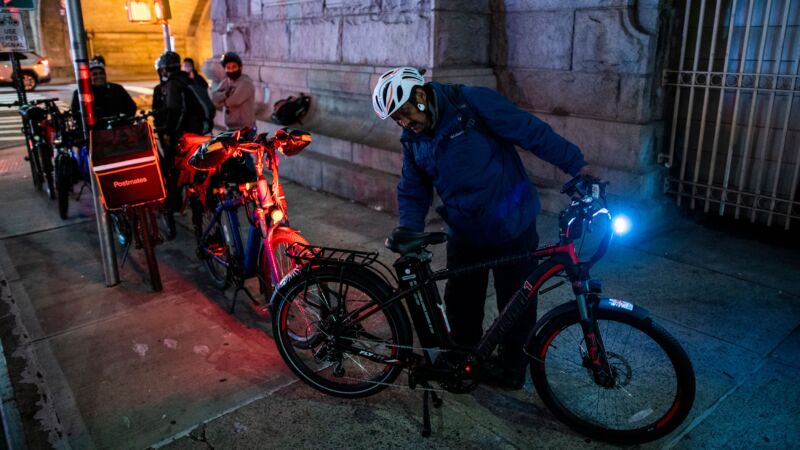

E-bike battery fires pushing NYC toward a ban in public housing
source link: https://arstechnica.com/tech-policy/2022/09/e-bike-battery-fires-pushing-nyc-toward-a-ban-in-public-housing/
Go to the source link to view the article. You can view the picture content, updated content and better typesetting reading experience. If the link is broken, please click the button below to view the snapshot at that time.
E-bikes —
E-bike battery fires pushing NYC toward a ban in public housing
Poorly made cells, tough work, and lack of space all contribute to deadly rise.
Kevin Purdy - 9/1/2022, 5:45 PM

A rising number of fires caused by lithium-ion batteries has spurred New York City's public housing authority to propose entirely banning e-bikes from their buildings. But the causes are not so simple, the solutions fiendishly complex, and the repercussions potentially devastating to thousands of hard-pressed delivery workers.
New York City firefighters have responded to 26 battery-based fires in public housing since 2021, according to reporting from The City. That includes fires in early August that killed a 5-year-old girl and 36-year-old woman in Harlem, and a death and injury in The Bronx. And battery-based fires are rising elsewhere in the city resulting in 73 injuries and five deaths, according to Canary Media, with 130 investigations so far this year. It's a sharp upturn from 104 battery fire calls the year before, 44 in 2020, and 30 in 2019.
The New York City Housing Authority's (NYCHA) response is a proposal to ban all e-bikes, and e-bike batteries, from public housing grounds by October 15. City officials advised NYCHA to ban battery-driven devices from housing in 2018, but NYCHA didn't move on a policy change until recently. (NYCHA is taking written comments on the proposed rule changes at [email protected].) Advocates for delivery workers and micro-mobility are pushing back, arguing that a blanket ban would punish low-income and immigrant delivery workers and generally discourage e-bikes as a lower-carbon means of getting around Gotham.
Lithium-ion battery fires get headlines, however, and for a reason. They accelerate quickly, burn extremely hot in thermal runaway reactions, and are self-sustainingly hard to extinguish. The typical e-bike battery is made up of dozens of individual AA-sized batteries (18,650 cells), wired together and managed by a battery management system (BMS). Any of those batteries could be poorly made, shorted, overheated, or mismanaged in charging by faulty, damaged, or water-logged easements, connections, or BMS.
AdvertisementUL has an e-bike certification standard (UL 2849) that includes battery design and encasement, which is typically utilized by reputable brands. But among New York City's estimated 65,000 bike-riding delivery workers, there are many DIY e-bike conversions, lesser-known brands and imports, and modifications to uncap voltage or speed limits. "It's not about high quality. It's about 'What can I afford?'" Hildalyn Colón-Hernández, policy director for delivery labor group Los Deliveristas Unidos, told Curbed in January. Even with UL certification, low-cost e-bike vendors can push hard on battery cells' parameters to eke out performance or range at higher risk.
That would all be potentially hazardous enough if the city's e-bikes were ridden under what manufacturers and their lawyers would call "normal use," but most delivery work is anything but. Charlie Welch, CEO of battery vendor Zapbatt, told The Next Web that, while vendors set standards, "everyone rides (e-bikes) like they stole them." Riders push bikes' speed and range all day, then leave them to fully charge overnight, perhaps the fastest way to age a battery. And aged batteries are even more prone to accidents and fires, as dendrites grow and threaten to bridge the anode and cathode in a battery.
An outright public housing ban would arrive long before the broader changes needed to address fires. Both e-bike advocates and opponents have recommended stricter regulations on batteries, whether at import or in the retail chain. Battery design and composition improvements are likely coming but are nowhere near ready to replace standard lithium-ion yet. Los Deliveristas Unidos is working toward communal bike storage, battery-charging, and bathroom "hubs" for delivery workers. One is underway in Brooklyn, and others could soon follow.
Coursing underneath all these solutions are the general conditions that have delivery drivers glued to their phones, sprinting to grab single orders of food and hauling them across a city that's still largely oriented toward cars, then repeating this dozens of times, sometimes in a single shift, for an average of $12.21 per hour, according to a 2021 survey of 500 app-based couriers.
One cheap and readily available bit of help suggested by many e-bike veterans in forums and subreddits (and in Canary Media's reporting): outlet timers. For $8 or less, e-bike owners can leave a battery plugged in overnight but ensure that it only charges for as long as it typically needs to reach full capacity. It's not a fix, but it could mean fewer fires.
Recommend
About Joyk
Aggregate valuable and interesting links.
Joyk means Joy of geeK